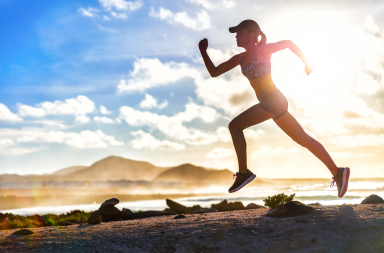For an athlete or fitness enthusiast, training is a cornerstone of everyday life. Though moderate exercise has shown to enhance the immune system, overtraining can lead to poor health and lackluster performance. It is necessary to balance training with adequate rest and proper nutrition to perform at a high level.
Too much training can deplete critical nutrients and fatigue cellular processes, which may result in low energy levels, poor performance, plus a weakened immune system. Recent research demonstrates how overtraining can lead to temporary immune suppression. Suppressed immunity is a normal result of fatigue in the body, not a disease or abnormal condition; and weakened immune defense can also happen to new parents, after many late nights with a crying baby!
One study looked at three groups: elite athletes, recreational athletes, and sedentary individuals. The study showed that elite athletes were twice as likely to have a respiratory incident than sedentary individuals, and four times more likely than recreational athletes. In the 5-month study, thirty-two athletically elite, thirty-one recreationally active, and 20 sedentary individuals participated. There were reports of thirty-seven upper respiratory episodes in 28 subjects.1
Another study related to elite athletes suggested that heavy or chronic exercise is associated with an elevated risk of upper respiratory illness (URI), a biomarker of decreased immunity. The temporary risk remained higher for a one or two week period after a marathon or long-distance race. Increased and heavy exertion has a detrimental effect on the immune system, as opposed to moderate exercise which can lead to positive changes in immune function.2
A strong immune system is important to maintain an active, healthy lifestyle. Suppression of this imperative system can not only lead to increased incident of infection or illness but can also contribute to fatigue and delayed recovery time, ultimately leading to missed training opportunities.
References
1. Spence L, Brown WJ, Pyne DB, et al. Incidence, etiology, and symptomatology of upper respiratory illness in elite athletes. Med Sci Sports Exerc. 2007;39(4):577-586. doi:10.1249/mss.0b013e31802e851a.
2. Nieman DC. Exercise, upper respiratory tract infection, and the immune system. Med Sci Sports Exerc. 1994;26(2):128-139. http://www.ncbi.nlm.nih.gov/pubmed/8164529. Accessed August 19, 2016.
3. Gleeson M. Immune function in sport and exercise. J Appl Physiol. 2007;103(2):693-699. doi:10.1152/japplphysiol.00008.2007.
4. Moynihan JA, Callahan TA, Kelley SP, Campbell LM. Adrenal hormone modulation of type 1 and type 2 cytokine production by spleen cells: dexamethasone and dehydroepiandrosterone suppress interleukin-2, interleukin-4, and interferon-gamma production in vitro. Cell Immunol. 1998;184(1):58-64. doi:10.1006/cimm.1998.1259.
5. Niess AM, Dickhuth HH, Northoff H, Fehrenbach E. Free radicals and oxidative stress in exercise–immunological aspects. Exerc Immunol Rev. 1999;5:22-56. http://www.ncbi.nlm.nih.gov/pubmed/10519061. Accessed August 19, 2016.
6. Godwin S, Bloomer RJ, Merwe M Van Der, Benjamin R. MSM enhances LPS-induced inflammatory response after exercise. J Int Soc Sports Nutr. 2015;12(Suppl 1): P48. doi:10.1186/1550-2783-12-S1-P48.
7. Barrager E, Veltmann JR, Schauss AG, Schiller RN. A multicentered, open-label trial on the safety and efficacy of methylsulfonylmethane in the treatment of seasonal allergic rhinitis. J Altern Complement Med. 2002;8(2):167-173. doi:10.1089/107555302317371451.
8. Nakhostin-Roohi B, Barmaki S, Khoshkhahesh F, Bohlooli S. Effect of chronic supplementation with methylsulfonylmethane on oxidative stress following acute exercise in untrained healthy men. J Pharm Pharmacol. 2011;63(10):1290-1294. doi:10.1111/j.2042-7158.2011.01314.x.
9. Marañón G, Muñoz-escassi B, Manley W, et al. The effect of methyl sulphonyl methane supplementation on biomarkers of oxidative stress in sport horses following jumping exercise. Acta Vet Scand. 2008;50(45). doi:10.1186/1751-0147-50-45.
10. Dröge W, Breitkreutz R. Glutathione and immune function. Proc Nutr Soc. 2000;59:595-600.


